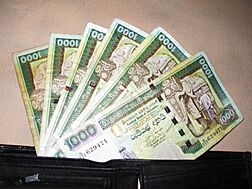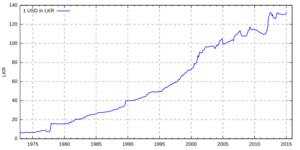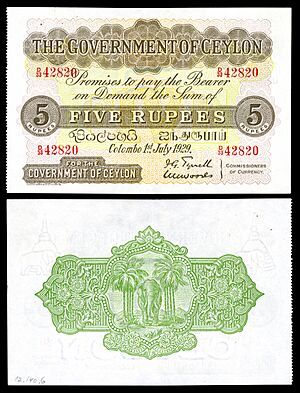Sri Lankan rupee facts for kids
Quick facts for kids Sri Lankan rupee |
|||
|---|---|---|---|
|
|||
| ISO 4217 Code | LKR | ||
| User(s) | |||
| Inflation | ▲ 1.70 % (2024) | ||
| Source | Central Bank of Sri Lanka | ||
| Method | CPI | ||
| Symbol | Rs | ||
| Coins | රු. 1/-, රු. 2/-, රු. 5/-, රු. 10/-, රු. 20/- | ||
| Banknotes | රු. 20/-, රු. 50/-, රු. 100/-, රු. 500/-, රු. 1,000/-, රු. 5,000/- | ||
| Printer | De La Rue Lanka Currency and Security Print (Pvt) Ltd | ||
The Sri Lankan Rupee (Sinhala: රුපියල්, Tamil: ரூபாய்) is the official money of Sri Lanka. Its symbol is රු. The international code for the Sri Lankan Rupee is LKR.
One Rupee is made up of 100 cents. However, cents are not often used today because they are worth very little. The Central Bank of Sri Lanka is in charge of making and giving out this money. People often use "Re" for one Rupee and "Rs" for more than one.
Contents
A Quick Look at Rupee History
The money used in Sri Lanka has changed a lot over time. Before the Rupee, Sri Lanka used a currency called the Ceylonese rixdollar.
From Pounds to Rupees
In 1825, the British pound sterling became the official money. British silver coins were also used. Later, in 1836, the Indian rupee became the main coin in Sri Lanka. Even with the Indian Rupee, British money was still used for keeping records.
In 1871, the Rupee system became decimalized. This means one Rupee was divided into 100 cents, just like it is today. This change officially happened on January 1, 1872. The Rupee then took over from the British pound system.
Money Challenges and Changes
In 1884, there was a banking problem in Sri Lanka. To help, the government created a special group called the Board of Commissioners of Currency of Ceylon. This group made sure that Sri Lankan money notes could be easily swapped for Indian Rupee coins.
More recently, in April 2022, the Sri Lankan Rupee faced big challenges. Its value dropped a lot compared to the US dollar. This was due to economic difficulties in the country.
Coins of Sri Lanka

Sri Lanka has used many different coins over the years. The first coins for the Rupee system came out in 1872. These included copper coins for small values like 1/4 cent, 1/2 cent, 1 cent, and 5 cents. Silver coins for 10 cents, 25 cents, and 50 cents followed in 1892.
Changes in Coin Materials
Between 1940 and 1944, many coins changed. For example, the 5 cent coin changed from a large copper coin to a smaller coin made of a mix of copper and nickel. Other coins also changed their metals. Some coins even featured Queen Elizabeth II or King George VI.
In 1963, new coins were made without the picture of the monarch (king or queen). Instead, they showed the national symbol of Ceylon (which is now Sri Lanka). These coins were made from different metals like aluminum and nickel brass.
Modern Coins
Today, the coins used in Sri Lanka show the national symbol of the Republic of Sri Lanka on one side. The other side shows the coin's value in numbers and in Sinhala, Tamil, and English. It also shows the year the coin was made.
Smaller value coins like 1 cent, 2 cents, 5 cents, 10 cents, 25 cents, and 50 cents are not used much anymore. They are also no longer being made.
In 2017, a brand new set of coins made from stainless steel was introduced. These are the coins you will see most often today.
| 2005 - Old coin series of Sri Lanka | |||||||||
|---|---|---|---|---|---|---|---|---|---|
| Image | Value | Obverse | Reverse | Metal | Diameter | Weight | Thickness | Edge | Year |
 |
25c | Armorial Ensign | Country name, year and value | Copper-plated Steel | 16.0 mm | 1.68 g | 1.2 mm | Plain | 2005 |
 |
50c | 18.0 mm | 2.5 g | 1.4 mm | Plain | ||||
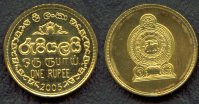 |
Re. 1/- | Brass-plated Steel | 20.0 mm | 3.65 g | 1.7 mm | Milled | |||
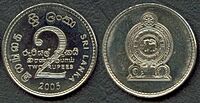 |
Rs. 2/- | Nickel-plated Steel | 28.5 mm | 7.0 g | 1.5 mm | Milled | |||
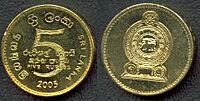 |
Rs. 5/- | Brass-plated steel | 23.5 mm | 7.7 g | 2.7 mm | Lettered | |||
| Rs. 10/- | Nickel-plated Steel | 26.4 mm (Hendecagon) | 8.36 g | 2.1 mm | Plain | 2009 | |||
2017 - New coin series
| 2017 New coin series of Sri Lanka | |||||||||
|---|---|---|---|---|---|---|---|---|---|
| Image | Denomination | Obverse | Reverse | Metal | Diameter | Thickness | Shape | Edge | Year |
| Re. 1/- | Country name, Armorial ensign and Year | Value | Stainless steel | 20 mm | 1.75 mm | Round | Intermitted Milled | 2017 | |
| Rs. 2/- | 22 mm | 1.75 mm | Notched | ||||||
| Rs. 5/- | 23.5 mm | 1.8 mm | Milled with regular indentations | ||||||
| Rs. 10/- | 26.4 mm | 1.8 mm | Eleven lobed | Milled with regular indentations | |||||
| Rs. 20/- | Aluminium Bronze | 28 mm | 2.0 mm | Seven lobed | Plain | 2020 | |||
Special Commemorative Coins
The Central Bank of Sri Lanka also makes special coins to remember important events. These are called commemorative coins. For example, in 2010, they made a colorful silver coin for their 60th Anniversary. In 2023, a Rs. 1000 coin was made for Sri Lanka's 75th Independence Day.
Banknotes of Sri Lanka
The first Rupee banknotes were introduced in Sri Lanka in 1885. Over the years, many different values of banknotes have been printed. These include Rs. 1, Rs. 2, Rs. 5, Rs. 10, Rs. 50, Rs. 100, Rs. 500, Rs. 1,000, and even Rs. 10,000 notes.
Modern Banknotes
Since 1977, the Central Bank of Sri Lanka has been responsible for issuing banknotes. New values like Rs. 20, Rs. 500, and Rs. 1,000 were added in the late 1970s and early 1980s. A Rs. 200 note was made in 1998 to celebrate 50 years of Sri Lankan independence. This was the first banknote in Sri Lanka made from a special plastic material called polymer.
Sri Lankan banknotes are unique because the pictures on the back are printed vertically. The front of the notes often features important people like former prime ministers and presidents. The back of the notes shows beautiful Sri Lankan animals, plants, landscapes, and scenes from its culture and history.
How the Rupee is Traded
The Sri Lankan Rupee is known as a "closed currency." This means you usually cannot buy or sell it outside of Sri Lanka. If you visit Sri Lanka, you can exchange your money for Rupees at the airport or at currency exchange places around the country.
In March 2023, the Rupee's value increased after the IMF announced a financial support plan for Sri Lanka. This news helped the Rupee become stronger against other currencies like the US dollar.
See also
- Economy of Sri Lanka
 | Janet Taylor Pickett |
 | Synthia Saint James |
 | Howardena Pindell |
 | Faith Ringgold |


